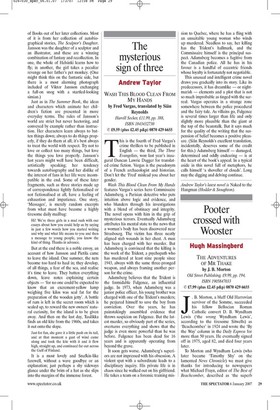The mysterious sign of three
Andrew Taylor WASH THIS BLOOD CLEAN FROM MY HANDS by Fred Vargas, translated by Sian Reynolds Harvill Secker, £11.99, pp. 388, ISBN 1843432730 © £9.59 (plus £2.45 p&p) 0870 429 6655 This is the fourth of Fred Vargas's crime thrillers to be published in English — the third, The Three Evangelists, won last year's inaugural Duncan Lawrie Dagger for translated crime fiction. Vargas is the pseudonym of a French archaeologist and historian. Don't let the 'Fred' mislead you about her gender.
Wash This Blood Clean From My Hands features Vargas's series hero Commissaire Adamsberg, a Parisian detective who puts intuition above logic and evidence, and who blunders through his investigations with a blend of obstinacy and integrity. The novel opens with him in the grip of mysterious terrors. Eventually Adamsberg attributes his mental state to the news that a woman's body has been discovered near Strasbourg. The victim has three neatly aligned stab wounds in her chest. A man has been charged with her murder. But Adamsberg is convinced that the killing is the work of the Trident, a psychopath who has murdered at least nine people since 1943, always with the same three-pronged weapon, and always framing another person for the crime.
Adamsberg believes that the Trident is the formidable Fulgence, an influential judge. In 1973, when Adamsberg was a junior police officer, his young brother was charged with one of the Trident's murders; he perjured himself to save the boy from conviction. Over the years, he has painstakingly assembled evidence that throws suspicion on Fulgence. But the latest murder, so obviously part of the series, overturns everything and shows that the judge is even more powerful than he was before. Fulgence has been dead for 16 years and is apparently operating from beyond the grave.
It soon gets worse. Adamsberg's superiors are not impressed with his obsession. A violent spat with a subordinate leads to a disciplinary inquiry. His private life is in chaos since he walked out on his girlfriend. He takes a team on a forensic training mission to Quebec, where he has a fling with an unsuitable young woman who winds up murdered. Needless to say, her killing has the Trident's hallmark, and the Commissaire himself is the principal suspect. Adamsberg becomes a fugitive from the Canadian police. All he has in his favour is a handful of eccentric friends whose loyalty is fortunately not negotiable.
This unusual and intelligent crime novel draws you gradually into its story. Like its predecessors, it has dreamlike — or nightmarish — elements and a plot that is not so much improbable as tinged with the surreal. Vargas operates in a strange zone somewhere between the police procedural and the fairy tale. As villains go, Fulgence is several times larger than life and only slightly more plausible than the giant at the top of the beanstalk. But it says much for the quality of the writing that the suspension of belief becomes a positive pleasure. (Sian Reynolds's excellent translation, incidentally, deserves some of the credit for this.) Adamsberg himself — damaged, determined and oddly endearing — is at the heart of the book's appeal. In a typical aside in this novel full of metaphors, he calls himself 'a shoveller of clouds'. Long may the digging and delving continue.
Andrew Taylor's latest novel is Naked to the Hangman (Hodder & Stoughton).




































 Previous page
Previous page